Your pet fish usually seems to have an insatiable hunger, but this morning something’s wrong.
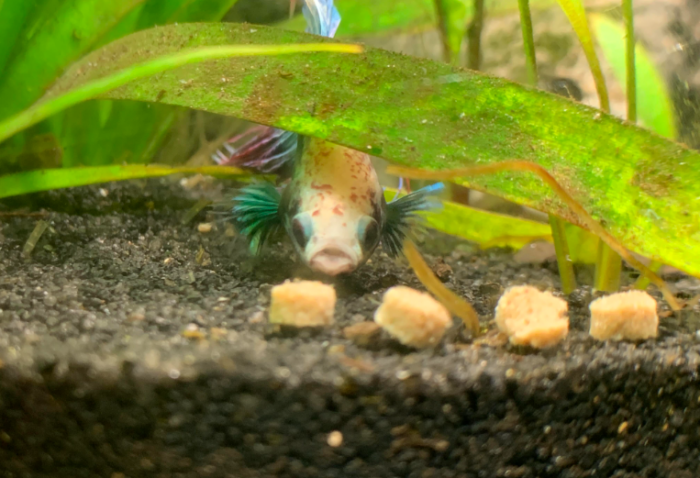
You’ve just discovered that your Betta fish won’t really eat food and barely moves around its tank. This may have something to do with the fish being new to the aquarium but it can also happen right after a water change. So why is your Betta fish still not eating and, if I had to guess, seems to prefer laying at the bottom of its tank? Is it sick or just being finicky?
Reasons why your Betta fish is not eating?
Before we start I should make it clear that a healthy Betta fish can live for more than a week without eating anything. However, if the fish refuses to accept readily available food it could mean that there’s an underlying issue to be resolved.
There are several reasons why a Betta fish won’t choose to eat its food:
If a Betta fish has no appetite it may be due to a stressful environment and subpar water quality in the aquarium. If your fish won’t try to eat, you should likely check for a stressful change in its water’s parameters or its surroundings.
1. The Betta is not used to its new fish tank.
A Betta fish who has been recently shipped or transported from the store will likely refuse to eat because of the stressful trip. A new Betta may not want to eat and may prefer to just hide for as long as a week before feeling confident enough to accept food.
To encourage your new Betta fish to eat you can:
- Feed the fish high quality food such as Daphnia or Bloodworm.
- Mix the fish food with an appetizer.
- Reduce close-up interactions with the fish for a week.
Though pellets and flakes may be okay for a while, a Betta fish will always prefer to eat live or frozen meaty food, because it is a carnivore by nature.
Commercial flakes and pellets will almost always contain various land-based vegetables, gluten wheat, and gluing agents. None of these ingredients aid the diet of carnivorous fish in a healthy way.
Frozen-dried and live foods are the type of meal that gets as close as possible to what the natural diet of a Betta fish would be in the wild.
These foods should be a great portion of the diet of a healthy Betta fish anyway, so now might be a good time to stock up.
I haven’t done a head-to-head test of every brand out there but I’ve had fantastic results with thawing Omega One’s freeze-dried bloodworms in aquarium water before the offering.
Note that any type of food will become more appealing to a fish if it’s soaked in garlic.
Garlic is a well-known appetizer for Betta fish, but you need to make sure you’re using aquarium-grade garlic.
Combining garlic and bloodworms is a sure way to encourage eating in a new Betta fish.
I can recommend using this or a similar garlic additive as I’ve had success with it so far.
2. A water change has caused Cold Shock to the fish.
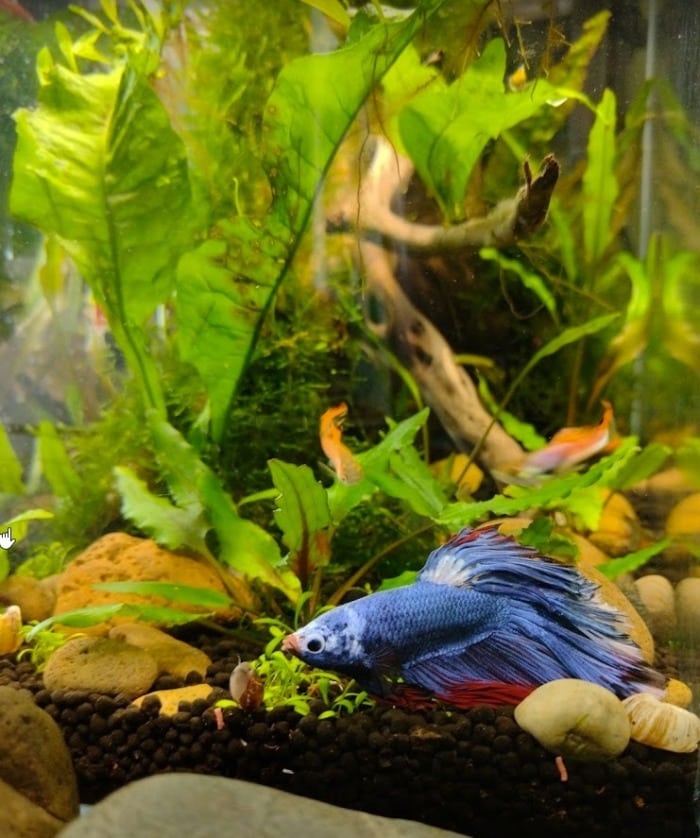
by mcmelonhead
If you use unheated water for water changes in an aquarium with tropical fish such as a Betta, the difference in the temperature may cause a severe thermal shock to the fish. Water temperature swings could immediately weaken the immune system of a Betta, resulting in no desire to eat and, consequently, disease or death.
To prevent water changes from causing temperature stress that hinders a Betta’s desire to eat you can:
- Set up a separate container with a small water heater to act as a supply for aquarium water changes.
- Make sure the temperature of the water in the container matches that of the aquarium before a water change.
A Cold Shock is a common reason for a Betta fish to stop eating right after a water change but is also one of the easiest issues to fix.
What works for me is setting up a small, 2 or 3-gallon bucket of water and throwing a tiny, inexpensive heater inside.
I dechlorinate the water and run the heater for a couple of hours before changing the water in my Betta fish aquarium.
I’m obviously using a thermometer in the bucket to make sure that the water temperatures match.
Look up some cheap aquarium heaters with a lot of positive reviews online or rush to your local fish store and get one when you have the time.
If you prefer shopping from your couch you can check out this unit or just browse around Amazon to find something that suits you.
3. Nitrate poisoning.
A sudden rise or a long-term exposure to Nitrate levels of 20 or more PPM in the aquarium water can poison your Betta fish. Nitrate poisoning is one of the most common reasons why a Betta won’t eat, and can also cause the fish to become lethargic.
When poisoned your Betta won’t have the desire to move and will likely prefer to lie on the bottom of its tank.
Nitrate toxicity has also been related to swim bladder disease, which causes a Betta to swim sideways or even upside-down.
If your Betta fish displays such symptoms you’d want to act quickly.
I have a detailed guide on emergency responses to aquarium fish poisoned by Nitrate. Visit the link and follow the steps to help your Betta get through the poisoning.
Soon after the disaster has been handled your Betta fish will return to its normal eating habits.
4. Your Betta fish has ammonia poisoning.
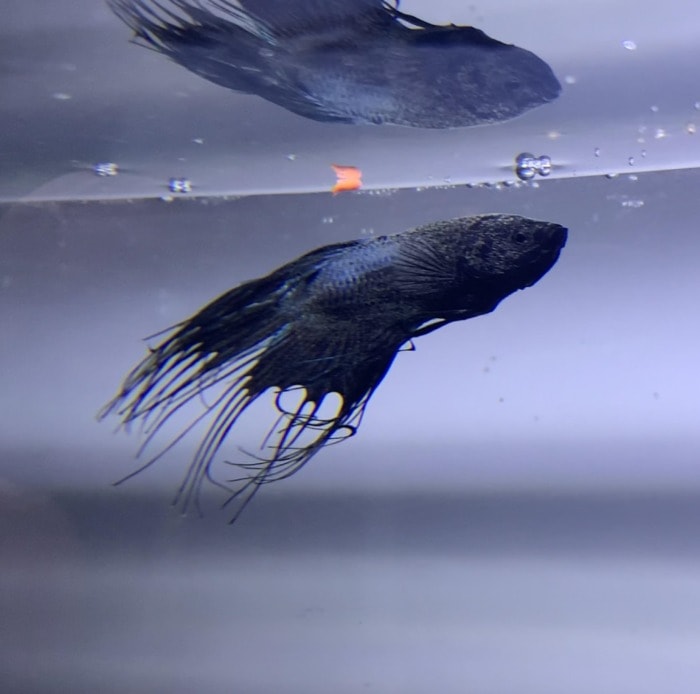
by gary_x
A Betta fish may not want to eat because there’s a sudden spike in ammonia levels in the aquarium water. You’ll want to immediately lower the Ammonia levels in the tank because Ammonia poisoning will make the fish lethargic and suppress its appetite.
Ammonia builds up in the aquarium from degrading organic matter such as uneaten fish food, and fish waste.
Other symptoms of ammonia poisoning in Betta fish would be red gills and rapid breathing.
What to do when your Betta fish is not eating because of an ammonia poisoning:
- Change 10% of the aquarium’s water each hour, until you exchange 30 to 40% of the total water volume.
- Add a water conditioner that detoxifies ammonia if the levels are above 2.5 ppm.
- Add a beneficial bacteria starter 24 hours after adding the water conditioner.
You’ll need to use a liquid test kit and confirm that the ammonia levels in the aquarium are elevated.
Test strips only give rough estimations and when you’re dealing with ammonia you need to assess the situation as precisely as possible.
Even 0.5 ppm (parts per million) of ammonia in the water can be detrimental to a Betta fish and, in some cases, suddenly kill the pet.
If you happen to have the API Master test kit on hand (link to see it on Amazon) it will do the job as it is one of the best liquid test kits.
Doing so will physically remove a large portion of the ammonia and your Betta fish will likely feel less burning in its gills.
For a variety of more complex reasons, exchanging more than 40% of the water could potentially stress your fish further.
To take care of the remaining ammonia, you should add some ammonia detoxifier such as Seachem’s Prime to the fish tank.
Prime will detoxify the ammonia for the next 24 hours or so, and you can use that time to rush to the fish store and get yourself a bottled bacteria starter.
An aquarium bacteria starter provides a set of beneficial aquatic bacteria that convert the ammonia to significantly less harmful substances in the aquarium.
Once fully established, the bacterial colony will take care of the ammonia themselves.
If you don’t have a fish store locally you can try ordering this bacteria supplement online.
5. It does not like its food.
As glutounuss as some Bettas are it is possible that yours denies food because it does not like what you’re offering.
There are three possible explanations for this.
If you got yourself a rare Betta from a local breeder there’s a chance that it was raised on live or frozen foods.
If you can source these types of foods properly they can be the best for a growing a healthy betta, and local breeders usually know that.
If fed like this as a baby the adult betta may not recognize commercially available pellets or flakes as potential food.
In that case, you should contact the breeder again and ask them what has worked for them.
The second reason a betta may not like its food is if the food is too old.
Realistically, you can’t expect a single betta to finish a whole can of food before the product gets stale.
After just a couple of months of opening the jar daily the food loses its smell. This smell is what makes foods seem tasty to your Betta.
Try getting a new jar of food or read up on some better brands and get that.
Finally, the third reason food may not be appetizing to a healthy betta is when you’re offering frozen foods but did not thoroughly thaw them beforehand.
If not properly thawed, frozen foods will not release their “smell” in the water and Bettas may fail to understand that it’s time to eat.
6. Osmotic shock caused by the sudden drop of ion content in the aquarium water.
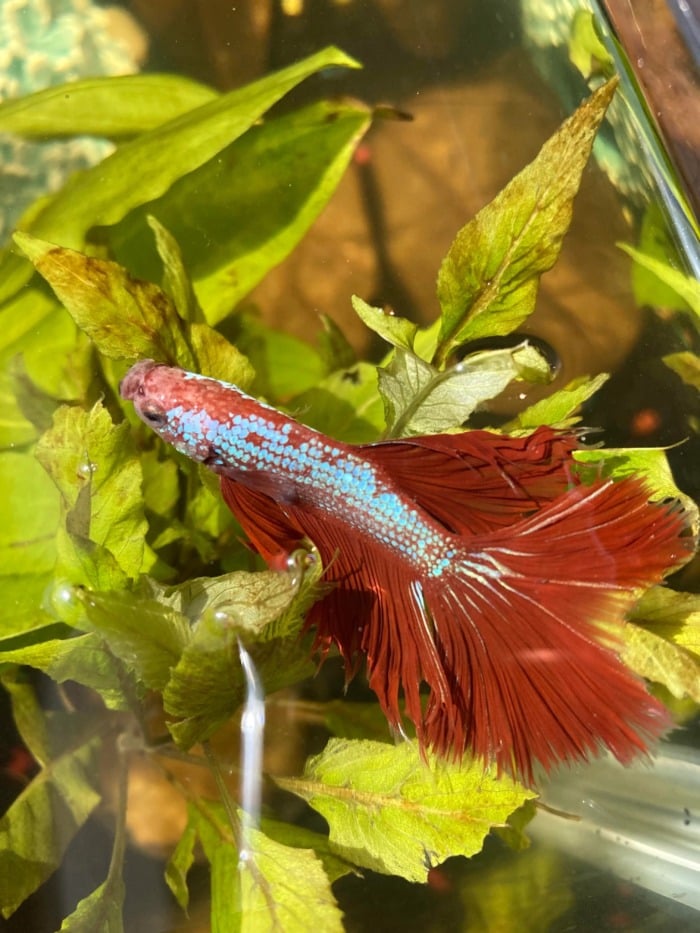
by ChristyMCS
Osmoregulation is the ability of fish to regulate their body fluids and maintain their internal pressure. There’s an inverse relationship between the ion content in the aquarium water and osmoregulation in Betta fish.
For example, when doing large water changes of 30% or more of the total water volume you effectively remove certain ions from the water, such as Nitrates.
The sudden drop in ion content sends your Betta fish in osmotic shock, causing its internal organs to swell. Repeated osmotic shocks may result in chronic osmoregulation failure in the fish, which manifests as a bloated abdomen at first and, consequently, swelling of the whole body (known as Dropsy).
Note that this does not mean that having high Nitrates in the aquarium is a good thing. It only means that lowering them should be a rather gradual process and not something sudden.
One of the symptoms a Betta may display when going through Osmotic Shock is a refusal to eat.
The organ swelling could also suppress the swim bladder of the fish, forcing the creature to swim upside down or sideways.
If your Betta fish won’t consume food due to Osmotic stress you can:
- Do smaller, more frequent water changes.
- Maintain an overall lower level of Nitrate in the aquarium.
- Add 1 tablespoon of aquarium salt per 5 gallons of water to alleviate the osmotic stress in the fish (should be done once).
Doing partial changes of 5 to 10% of aquarium water per hour, instead of a single 30% one could prevent Osmotic shock in Betta fish.
You could also use various methods to keep the overall Nitrate levels in the aquarium water low.
One thing that can alleviate the osmotic shock is bumping the ion content in the water through aquarium salt.
This in turn will return its appetite back to normal.
7. It’s a male Betta and he is guarding a bubble nest.
A bubble nest is a cluster of air bubbles on the water’s surface, carefully arranged by a male Betta who’s waiting or searching for a female to spawn with. Sometimes male Betta fish get preoccupied with building and guarding their bubble nests and refuse to take food. This is somewhat common behavior for them and they will often go without eating for long periods of time.
If your male Betta refuses to eat because he’s guarding his bubble nest you can:
- Remove the bubble nest.
- Find him a female to mate with.
Finding a mate to your Betta is a rather difficult task, especially if you’re new to the hobby.
You’d need to buy the female from a reputable breeder in order to get information on her genetics and age.
You’ll also need to provide an aquarium divider (a special net, essentially) for the two to get comfortable with living in the same tank without tearing each other apart.
Your male could be in top shape and the female may still not like him if he’s not the right color, as the preferred choice is red, research shows.
Because of this, I would recommend that you just remove the nest.
Your male Betta will soon move on with his life and start eating again.
8. Too much flaring at its reflection.
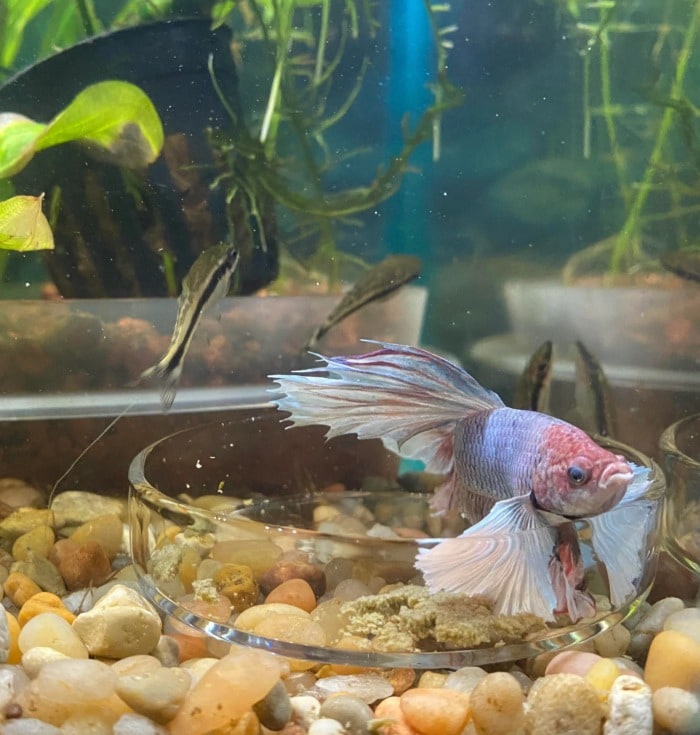
by BooPandaa
Sometimes a Betta may see its own reflection in the aquarium glass and treat it as a potential rival for territory. This may lead to continuous gill flaring and chronic stress for the fish. The Betta fish will be constantly wary of an upcoming fight, in which case it won’t have the desire to eat.
If your Betta is not eating because of flaring at its reflection you can:
- Tune down or adjust the aquarium lighting to eliminate the reflection.
- Cover the sides of the glass tank with a non-reflective material.
- Put more decoration in the aquarium to block the Betta’s line of sight.
9. Sickness from elevated stress levels.
If your Betta has not eaten in more than a week or two then it’s very likely the fish is ill and something needs to be done.
A lack of appetite is a very common symptom of an ill fish that may die soon.
Contact a fish veterinarian if you suspect that your betta may be sick with something.
Unfortunately, there are a plethora of fish diseases and infections that can leave your Betta with no desire to eat.
However, initiating a good food regimen could be enough for the Betta fish to build up its immune system to full recovery.
Illness is the result of a stressful aquarium environment.
Studies suggest a direct relationship between chronic stress and a weakened immune system in fish.
For this reason, keeping your Betta happy by eliminating stress factors in the aquarium is vital for its long-term well-being.
Some common stress factors that could weaken the immune system of a Betta fish are:
- Water temperature swings
- Poor water quality (elevated levels of ammonia, nitrite and nitrate)
- A volatile pH
- Lack of decor and hiding places such as live plants, artificial caves, and driftwood
- Feeding your Betta exclusively on pellets and other processed foods
Having the basic aquarium necessities such as a good aquarium heater, a filter, and feeding your Betta live or frozen live foods can usually keep the fish in top shape.
Studies show that offering quality food to your aquarium fish may be linked to them developing a stronger immune system.
As I suggested at the beginning of this article one of the best ways to feed a Betta fish that would not eat is by giving it something like Omega One’s freeze-dried bloodworms.
Other good options for live or freeze-dried food are also brine shrimp, daphnia, mosquito larvae, Mysis shrimp, and tubifex worms.
On the other hand, having live plants and hiding places in the fish tank will provide a safe space for your Betta.
Floating plants, for example, replicate the natural environment of Betta fish and help them feel more confident and less stressed.
Floaters are also what you may call “nutrient sponges” because they consume large amounts of Nitrogen from the water.
They get their Nitrogen from ammonia, nitrite, and nitrate.
Needless to say, having a good number of floating aquarium plants is surprisingly beneficial to the water quality in a fish tank.
I can recommend getting a Dwarf Water Lettuce for your Betta fish, but you could check some more options here.

Striving for a stress-free life
As you may have guessed already, the most important thing for a healthy Betta is a stress-free environment. It’s one thing if the fish is a picky eater, but quite another if it continuously refuses to eat high-quality foods.
Make sure your pet fish is not agonizing physically and mentally and its appetite will return.
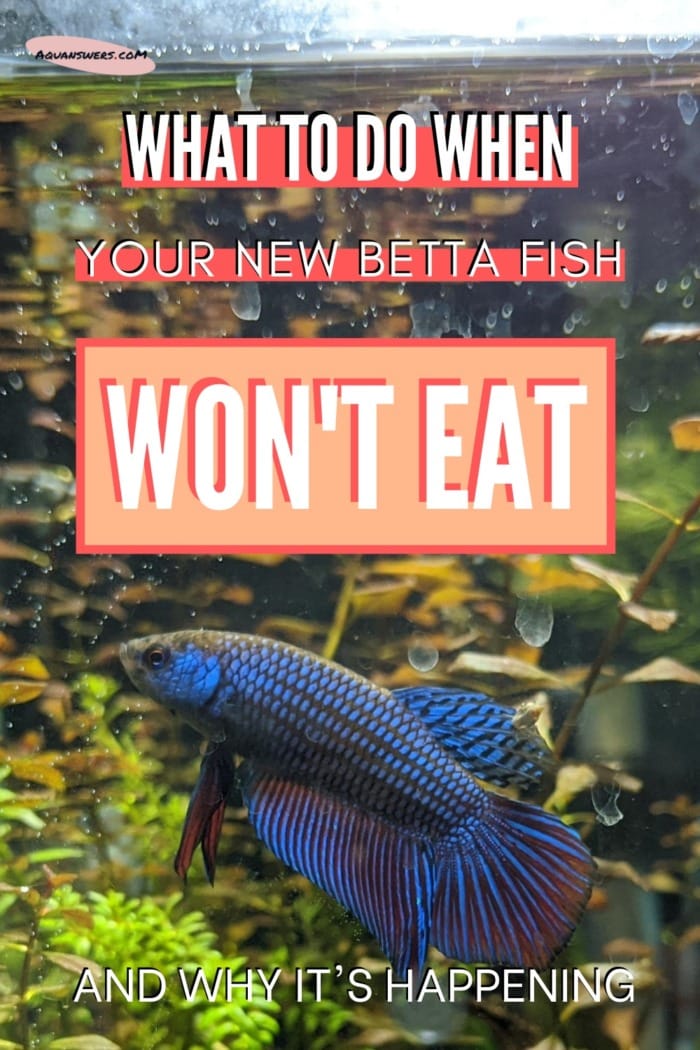
Leave me a comment if you’d like to get more answers and don’t forget to mention your fish tank’s water parameters.


